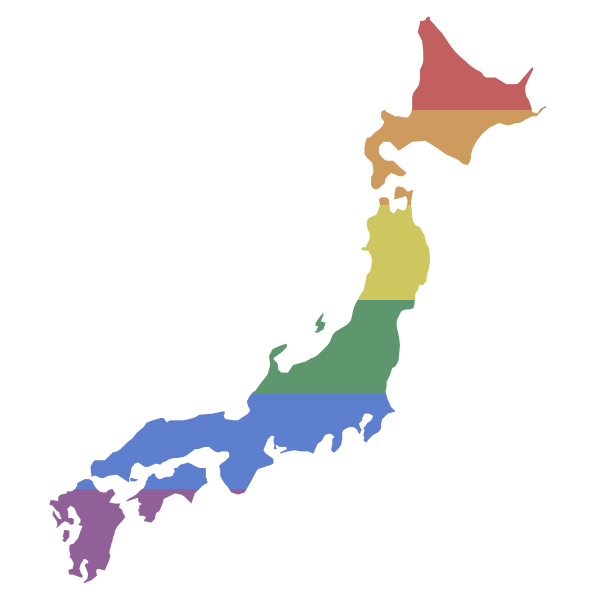- Homosexuality
- ⚢✔ Legal
- Gay Marriage
- ⚭✖ Unregistered cohabitation
- Censorship
- ✔ No censorship
- Changing Gender
- ✖ Legal, but requires surgery
- Gender-Affirming Care
- ✖ Legal, but restricted for minors
- Non-Binary Gender Recognition
- ✖ Not legally recognized
- Hate Crime Protections
- ✖ No protections
- Discrimination
- ✖ Illegal in some contexts
- Employment Discrimination
- Varies by Region
- Housing Discrimination
- ✔ Sexual orientation and gender identity
- Adoption
- Ambiguous
- Intersex Infant Surgery
- ✖ Not banned
- Military
- ✔ Legal
- Donating Blood
- ✖ Banned (6-month deferral)
- Conversion Therapy
- ✖ Not banned
- Age of Consent
- ✔ Equal
Public Opinion
In Japan, public opinion seems to reflect a lack of acceptance or understanding of the LGBTQ+ community.
History
Homosexual activity in Japan is legal.
Same-sex marriage in Japan is unregistered cohabitation.
Following this decision, the government reported on January 21, 2025, that various ministries and agencies had identified similar language in 24 laws and regulations. These include the Domestic Violence Prevention Act, the Land and Housing Tenancy Act, the Child Abuse Prevention Act, and the Public Housing Act.
On September 30, 2025, the government announced that nine new laws containing the same phrase could include same-sex couples within their scope. They also announced that 120 laws, primarily related to social security, do not cover same-sex couples.
Beginning in March of 2021, district courts and high courts across Japan have ruled that Japan restricting marriage to opposite-sex couples is unconstitutional. However, these court rulings do not have any actual effect on the law.
More than 200 municipalities across Japan have introduced partnership systems which give same-sex couples the ability to register their relationships. However, the registration is not legally binding and it does not grant any of the rights of marriage.
Censorship of LGBT issues in Japan is no censorship.
Right to change legal gender in Japan is legal, but requires surgery.
On October 16th 2023, a Japanese transgender man won his case in court to allow him to change his legal gender without sterilization. The law was deemed unconstitutional. It remains to be seen what changes will be made to the law and when they will come in effect.
Gender-affirming care in Japan is legal, but restricted for minors.
Legal recognition of non-binary gender in Japan is not legally recognized.
However, the city of Yokosuka recognizes the relationships of people of all genders, including "x-gender", the common term for non-binary in Japan.
Hate crime protections in Japan is no protections.
LGBT discrimination in Japan is illegal in some contexts.
LGBT employment discrimination in Japan is varies by region.
Companies in Japan consisting of ten or more employees are required to establish work regulations. In January 2018, the Ministry of Health, Labor and Welfare revised the Model Rules of Employment which "stands as the example framework for work regulations", to prohibit discrimination based on sexual orientation and "gender identification". Article 15 reads:
In addition to what are provided for from Article 12 to the preceding paragraph, employees are prohibited from any other forms of harassment at the workplace that are damaging to the work environment of other employees such as by way of speech or behaviour related to sexual orientation or gender identification.
LGBT housing discrimination in Japan is sexual orientation and gender identity.
In February 2018, the Ministry of Health, Labor and Welfare created provisions addressing discrimination in housing, stating that "consideration must be taken to not deny lodging on the basis of sexual orientation or gender identity."
Same-sex adoption in Japan is ambiguous.
It was reported in 2016 that many same-sex couples have been rejected by public authorities and are told “Children will never be fostered” by same-sex couples and “couples of friends are not accepted.”
There is however one documented case from 2016 of same-sex foster parents in Osaka.
Intersex infant surgery in Japan is not banned.
Serving openly in military in Japan is legal.
Blood donations by MSMs in Japan is banned (6-month deferral).
Conversion therapy in Japan is not banned.
Equal age of consent in Japan is equal.
LGBT Rights by Perfecture
View the LGBT laws in each individual perfecture of Japan.
- Aiti
- Akita
- Aomori
- Ehime
- Gihu
- Gunma
- Hirosima
- Hukui
- Hukuoka
- Hukusima
- Hyôgo
- Ibaraki
- Isikawa
- Iwate
- Kagawa
- Kagosima
- Kanagawa
- Kumamoto
- Kôti
- Mie
- Miyagi
- Miyazaki
- Nagano
- Nagasaki
- Nara
- Niigata
- Okayama
- Okinawa
- Saga
- Saitama
- Siga
- Simane
- Sizuoka
- Tiba
- Tokusima
- Totigi
- Tottori
- Toyama
- Wakayama
- Yamagata
- Yamaguti
- Yamanasi
- Ôita
- Kyôto (Urban Perfecture)
- Ôsaka (Urban Perfecture)
- Tôkyô (Metropolis)
- Hokkaidô (Territory)







